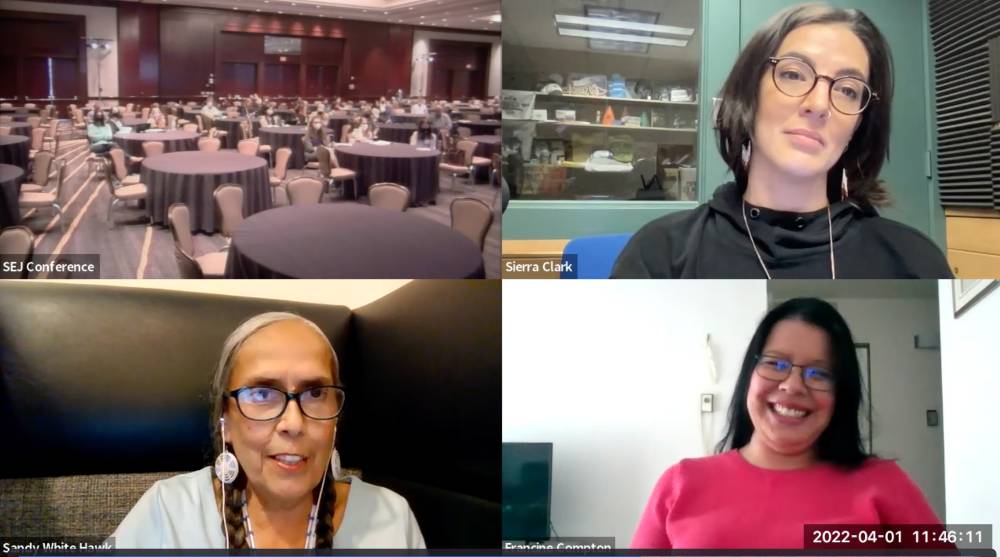
- Details
- By Valerie Vande Panne
Today we are hosting a panel discussion at the Society of Environmental Journalists 2022 Conference: Covering Indian Country for Non-Natives.
Our panelists are: Sierra Clark, reporter; Sandy WhiteHawk, source; and Francine Compton, journalist and Native American Journalists Association (NAJA) president.
These are three powerful people from tribes across Indian Country whose words hit with the full force of truth for a full hour and 15 minutes. Attending the panel were, perhaps, the quietest group of reporters I’ve ever seen. They listened. They took notes. They pondered what they heard.
Francine spoke about NAJA’s “bingo card,” encouraging the reporters to use it and if they got “bingo,” or even close to “bingo,” there is probably something seriously wrong with the reporting, among other things, including the NAJA Spotlight Report, analyzing the New York Times’ generally poor coverage of Native Americans.
Sierra spoke about what it’s like working in a newsroom as the only Indigenous person.
And Sandy spoke about what reporters do wrong when they interview her–and it was a lot.
Because journalism is inherently extractive.
I could wax poetic about the deep insights these powerful women shared–but instead encourage you to watch, or listen, to the panel for yourself, here.
Since our panel was happening in the same room as the luncheon plenary, we ended promptly at 12:15 p.m., as hungry reporters made their way in for lunch.
And it was during the luncheon plenary when I started to feel saucily cynical, as I hear tech bros brag about batteries and carbon capture and I smell the stench of capitalistas vying for media ink and attention.
At a conference of journalists.
As one attendee told me afterward: “This panel made me realize environmental journalists aren’t necessarily environmentalists.”
Truth.
I politely excused myself from the luncheon, which sounded like a sales pitch with five men from Meta on a TEDx stage.
When I got into the hallway, other women were there and more followed me out. As one woman put it: “I can’t believe the main plenary is a manel.”
Manel [man-l] noun. An all-male panel discussion.
After some time chatting with other women in the halls, it’s time for the next panel, on landfills, and then a special U.S. EPA press conference, which was not so much groundbreaking as it was disappointing–more cheerleading than answers or accountability. Some of the regional representatives, who were scheduled to be available to answer press questions directly, never showed up.
As the afternoon wore into evening, I felt relief that our panel was so well-received. I continue to hear kind words about it, which is nice.
We really don’t use enough words saying what is right in journalism, let alone society. The feedback is and was appreciated.
Watch: Covering Indian Country for Non-Natives
Read previous reporter’s notebooks from SEJ:
Reporters Notebook from: Society of Environmental Journalists 2022 Conference, Day Two
Reporters Notebook from the Society of Environmental Journalists 2022 Conference, Day One
More Stories Like This
Southern Sierra Miwuk Nation Gets 900-Acres ofLand BackChilkat Indian Village Tells New Palmer Mine Owners They Are “Not Welcome” in Chilkat Valley
Tribes, Coastal Group Ask Army Corps to Revoke Permit for Texas Export Terminal
Michigan Tribes Tell Supreme Court: Don’t Bail Out Enbridge
Alaskans Raise More Than $1 Million For Communities Devastated by Typhoon Halong
Help us defend tribal sovereignty.
At Native News Online, our mission is rooted in telling the stories that strengthen sovereignty and uplift Indigenous voices — not just at year’s end, but every single day.
Because of your generosity last year, we were able to keep our reporters on the ground in tribal communities, at national gatherings and in the halls of Congress — covering the issues that matter most to Indian Country: sovereignty, culture, education, health and economic opportunity.
That support sustained us through a tough year in 2025. Now, as we look to the year ahead, we need your help right now to ensure warrior journalism remains strong — reporting that defends tribal sovereignty, amplifies Native truth, and holds power accountable.
 The stakes couldn't be higher. Your support keeps Native voices heard, Native stories told and Native sovereignty defended.
The stakes couldn't be higher. Your support keeps Native voices heard, Native stories told and Native sovereignty defended.
Stand with Warrior Journalism today.
Levi Rickert (Potawatomi), Editor & Publisher

